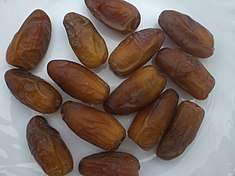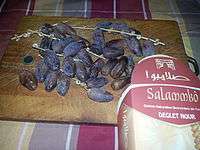Deglet Nour
Deglet Nour also spelled Deglet Noor (Modern Arabic: دقلة نور; from Classical Arabic دقْلَة النُور :daqlatu (a)n-nūr - literally, "date-palm of light"; "heavenly date"; from Classical Arabic دقل daqal, a kind of date palm) named also Royal Dates[1]—is a cultivar of the date palm. Commonly referred to as the "queen of all dates",[2] the authentic North-african Deglet Nour date has a soft touch, a translucent light color and a soft honey-like taste, characteristics which distinguish it from other dates.


Deglet Nours are popular in Algeria, Libya, Tunisia, and the United States where it is grown in inland oases and is the chief export cultivar. Despite being grown in several Mediterranean countries, the Deglet Nour dates' origin is disputed between Algeria and Tunisia, with both countries claiming the right to the label "Deglet Nour". Tunisia (the world-leading export country of Deglet Nour dates with a market share of 48 percent) and Algeria ( the leading producer with only 20 percent market share) are the main suppliers to the European Union.[3].
Deglet Nour is one of hundreds of cultivars of date palm but is, according to the Food and Agriculture Organization of the United Nations (FAO), the leading date in terms of export value.[4]
Origins
Several old books provide evidence that the Deglet Nour date was first grown in Algeria. Among them are Le palmier-dattier by Pierre Munier, L'Algérie: un siècle de colonisation française by Félix Falck, Un voyage au pays des dattes by Jean-Henri Fabre as well as le Bulletin de la Société botanique de France. Munier states that the fruit was introduced at the end of the 13th century and at the beginning of the 14th century in the areas of Biskra and Oued Righ in Algeria before being brought to Tunisia at the end of the 17th century by a grower from Tozeur named Sidi Touati.
The Algerian Ministry of Agriculture has decided to act in order to reserve the Deglet Nour label to Algerian dates.[5]
Production
This cultivar of date is mainly grown in Algeria (Tolga, Oued Righ), in Tunisia (in the areas of Jérid and Nefzaoua), and in the United States (in California, Arizona and Texas) where this cultivar was brought at the beginning of the 20th century.
References
- "Royal Algeria Dates". www.royal-dates.com. Retrieved 18 November 2018.
- "Organic deglet nour Dates BeniGrebh". www.ecohazoua.org. Retrieved 5 June 2018.
- http://www.fao.org/docrep/006/J1851E/j1851e05.htm
- "6 DATE VARIETIES". Fao.org. Retrieved 2014-02-01.
- http://www.algerienews.info/benaissa-promet-de-recuperer-le-label/